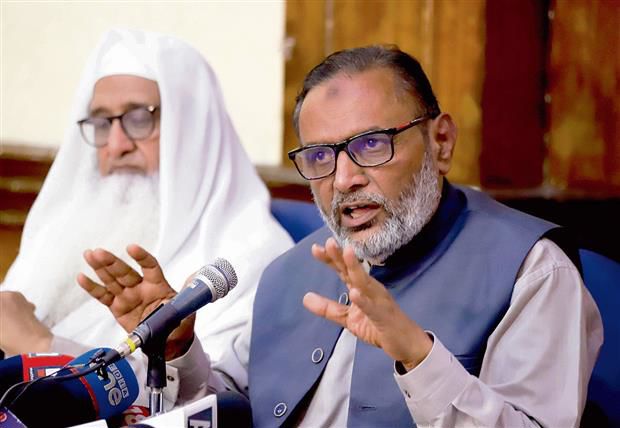Muslim Board to challenge SC ruling on alimony, Uttarakhand UCC
New Delhi, July 14
The All-India Muslim Personal Law Board (AIMPLB) announced on Sunday its intention to challenge the Supreme Court’s recent verdict allowing divorced Muslim women to seek maintenance beyond the “Iddat” period. Additionally, the board plans to oppose the recently enacted Uniform Civil Code (UCC) in Uttarakhand. These resolutions were decided upon during a working committee meeting, according to spokesperson Syed Qasim Rasool Ilyas.
Addressing mediapersons here, Ilyas stated, “Our first resolution addresses the Supreme Court’s judgment, which conflicts with the Sharia law. Islam views marriage as a sacred union, discouraging divorce. Although the ruling aims to support women, it may complicate their marital relationships. We will consult our legal experts to challenge this decision.”
On July 10, the Supreme Court declared that Section 125 of the CrPC applies to all married women, including Muslims. The justices emphasised the need for Indian men to provide consistent financial support, such as joint accounts and unrestricted access to ATMs.
“The board believes that the ruling will instead become a problem for the women because if the man has to give lifetime maintenance to the woman even after divorce, why will he give divorce in the first place? Instead, the problems and issues that have arisen in the relationship will continue, and the women will be the sufferers,” Ilyas explained.
The AIMPLB authorised its president, Khalid Saifullah Rahmani, to initiate all possible measures — “legal, constitutional and democratic” — to ensure that this decision by the Supreme Court is “rolled back”, Ilyas said.
Regarding the UCC, Ilyas stated that their legal committee is working on the process to challenge the UCC law in Uttarakhand.
“Diversity is the identity of our country, which our Constitution has preserved. The UCC attempts to end this diversity. The UCC is not only against the Constitution but also against our religious freedom. The UCC passed in Uttarakhand is causing a lot of trouble for everyone. We have decided to challenge the UCC in Uttarakhand, and our legal committee is preparing for it,” he added.
The spokesperson also highlighted the dispute based on religion in the country, citing the Places of Worship (Special Provisions) Act, 1991. “In our country, before the Babri Masjid incident, there was a law called the Places of Worship (Special Provisions) Act, 1991. All people think that the Babri Masjid would be the last religious dispute in India. It is unfortunate that new disputes are still emerging. We are presenting in court that these disputes should not be entertained under the Places of Worship Act. We request the Supreme Court to include the religious act in the latest disputes,” Ilyas said.
‘Islam discourages divorce’
Islam views marriage as a sacred union, discouraging divorce. Although the ruling aims to support women, it may complicate their marital relationships. — Syed Qasim Rasool Ilyas, AIMPLB spokesperson









